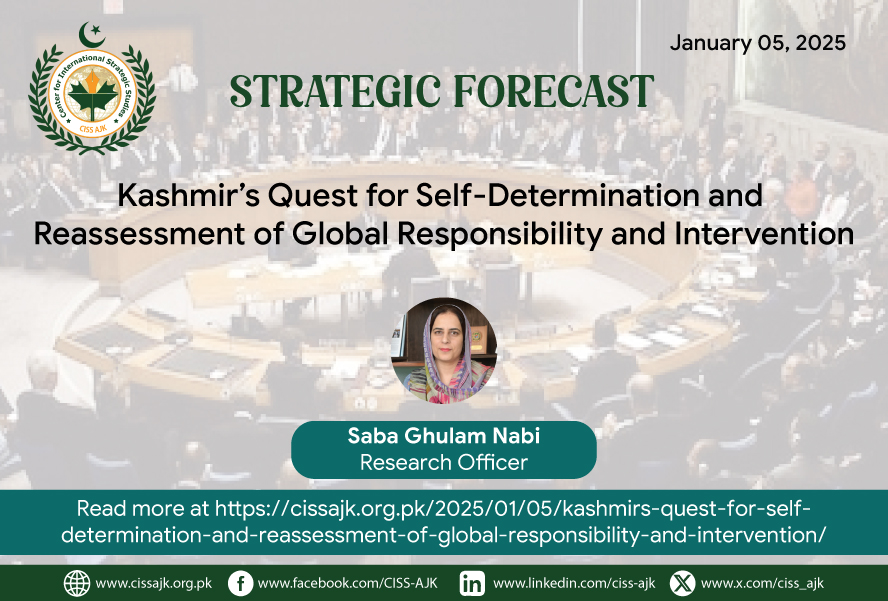After the division of the subcontinent, the state of Jammu and Kashmir became a burning dispute between the newly established states, Pakistan and India, in 1947. India approached the United Nations on January 1, 1948, to resolve the issue of Kashmir. On January 5, 1949, after hearing the stance of both Pakistan and India, the United Nations Security Council (UNSC) passed a resolution recognizing the Kashmiris’ right to self-determination. The resolution stipulated that the future of the state of Jammu and Kashmir was to be decided by its people through a plebiscite under the United Nations (UN) supervision. Although the resolution materialized the notion of the right to self-determination, which exhibited a sense of optimism among Kashmiris regarding the prospect of liberation, which has greatly attenuated with the course of time. Despite the passage of seventy-five years, the international organization (UN) has not yet been able to implement the resolutions it adopted, much to the disillusionment of those who anticipated any tangible outcomes of the resolution.
It is to be admitted that the Kashmiris’ fight for freedom is incredible. Seventy-seven years of unremitting struggle shows their determination and commitment to their freedom from the clutches of India’s brutal occupation. However, ongoing human rights violations and the current situation in Kashmir call into question the credibility of not only the United Nations but also other international organizations dedicated to peace and human rights. The right to self-determination was the Kashmiri people’s deepest aspiration, but India’s stubborn stance, along with the apathy of world powers, has prevented this dream from becoming a reality. It is a fundamental right that every nation has and that the international community recognizes.
Although the Kashmiri people celebrate January 5th as the “Day of the Right to Self-Determination,” commemorating the first United Nations resolution that addressed the Kashmir issue and recognized the Kashmiris’ right to self-determination, despite dozens of subsequent resolutions, the UN has failed to keep its promises. In the absence of meaningful UN action, global powers must take responsibility for ensuring a decent and peaceful living for the Kashmiri people. Pakistan has diligently explored every avenue to alleviate the suffering of Kashmiris, providing them an opportunity to determine their future peacefully. From diplomatic channels to engaging in armed conflict over Kashmir, Pakistan has spared no effort in attempting to address this enduring dispute, one that has repeatedly brought two nuclear-armed neighbors to the brink of war.
In recent history, global powers have played significant roles in conflict resolution and ensuring oppressed communities’ right to self-determination. South Sudan is a major example. After decades of civil war, the warring factions in North and South Sudan refused to negotiate. However, the United States, along with Great Britain and Norway, played a key role in resolving the conflict. The U.S. facilitated peace negotiations, resulting in the Comprehensive Peace Agreement (CPA) in 2005. This agreement guaranteed a peaceful referendum, which was conducted in 2011. An overwhelming 99% of South Sudanese voted in favor of independence, achieving their dream of a sovereign nation. This case demonstrates that when global powers actively intervene, conflict resolution and the guarantee of basic human rights become feasible.
In the case of Kashmir, where the stakeholders include three nuclear powers, International powers, including the United Kingdom should play an active role. Not only is Britain relatively neutral in this matter, but it also has a historical responsibility for the Kashmir issue, for three key reasons. The first one is that the Kashmir issue is a byproduct of the division of the Indian subcontinent. During the partition, Britain left unresolved issues, including Kashmir, which became a source of conflict immediately after independence. The second one is that it was Britain’s Prime Minister, Clement Attlee, who advised Jawaharlal Nehru to take the Kashmir dispute to the United Nations. Subsequently, the United Nations recommended a plebiscite as a mechanism to determine the will of the Kashmiri people.
And the third reason is that Britain is home to millions of Kashmiri diaspora members who are playing their role in highlighting the Kashmir issue internationally, but now they should change their strategy by campaigning and advocating for a resolution to this lingering conflict in the light of international law.
The unprecedented sacrifices of the Kashmiri people have demonstrated their unwavering commitment to achieving freedom. The global powers need to understand this and shun their indifference and pay heed to the wounds that always bleed. The Kashmir conflict, as a nuclear flashpoint, needs the ultimate attention of the international powers, given its relevance to global stability. The ultimate solution lies in granting the Kashmiri people their fundamental right to self-determination.
Author
Saba Ghulam Nabi , Research officer at CISS AJK

